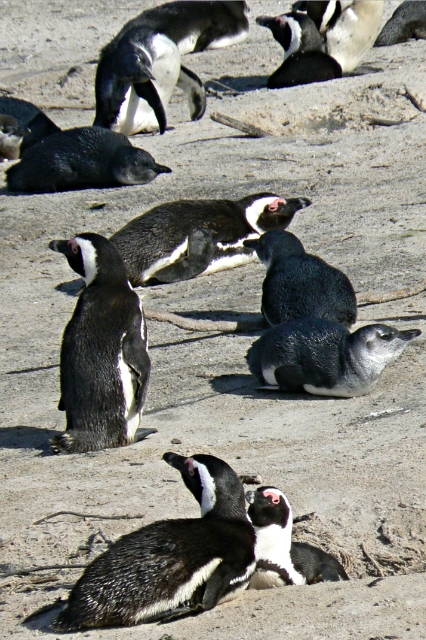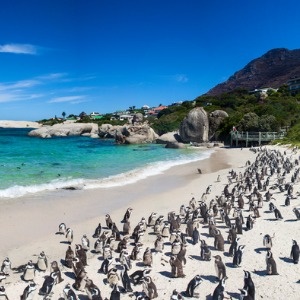The site is also an Important Bird Area (IBA SA117 Boulders Bay)
Site Description:
Boulders Bay is situated in Simon's Town, on the False Bay coast of the Cape Peninsula, 35 km south of Cape Town. The site consists of small beaches holding sandstone boulders and thickets of strandveld vegetation extending approximately 2 ha.
Birds:
African Penguins Spheniscus demersus, which breed beneath the coastal strandveld, colonised Boulders Bay in 1985, when two breeding pairs were recorded. The colony has increased steadily, and there were more than 700 active nests in 1997. This is one of only three mainland breeding sites in the world. Small numbers of Crowned Cormorant
Phalacrocorax coronatus occasionally roost on the rocks and African Black Oystercatcher
Haematopus moquini are occasionally seen along the beach. Cape Spurfowl
Pternistis capensis and Cape Bulbul
Pycnonotus capensis are strandveld residents. Cape Sugarbird
Promerops cafer occasionally visit from the slopes above the beach.
Conservation issues:
This area has recently been incorporated into the Table Mountain National Park, and is under the jurisdiction of National Parks Board. The African Penguin population at Boulders Bay has been increasing steadily since it was first colonised in 1985. This is one of the few growing colonies in the world, and it is thought that birds may be relocating here from Dyer Island (IBA SA120) where the population has decreased markedly since the mid-1980s.
Competition with commercial fisheries, especially purse-seining for surface-shoaling fish such as Pilchard Sardinops sagax, has been implicated as one of the most significant factors causing the global population decline of the African Penguin. The penguins may be relocating to Boulders Bay and Robben Island (SA IBA110) because of the restrictions on purse-seine fishing in False and Table Bay respectively. It has been speculated that the localised protection of their food resources may allow for improved breeding success and survival.
Birds breed primarily under the strandveld vegetation, but will breed on the beach and in every available rock crevice. Threats at Boulders include predation by Feral Cats
Felis catus and Smallspotted Genet
Genetta genetta. Although disturbance by tourists may be a problem, the penguins at this site are remarkably tame and the colony continues to increase in numbers and size despite exposure to large numbers of people. Measures to control excessive disturbance by visitors are being implemented. The education value of the site is immense and many thousands of visitors come here for the express purposes of viewing penguins. The education and tourism potential is massive, and it remains largely untapped.
African Penguins at Boulders have developed a habit of sheltering under cars in the parking lot, and vehicular traffic has been known to disturb and kill penguins. Awareness campaigns and measures to reduce this unnecessary mortality are essential.
Another problem which is difficult to predict or control is chronic pollution by crude oil or other environmental pollutants when tankers break open, tank wash, dump cargo or pump bilge. Penguins are affected particularly badly by these activities and a single oil disaster can severely affect populations. The Apollo Sea oil-spill disaster in the late 1980s resulted in many Globally near-threatened penguin deaths in and around the Cape Peninsula. The South African National Foundation for the Conservation of Coastal Birds (SANCCOB) has cleaned, rehabilitated and returned some 3 000 penguins to the wild between 1981 and 1991.
Key Species:





